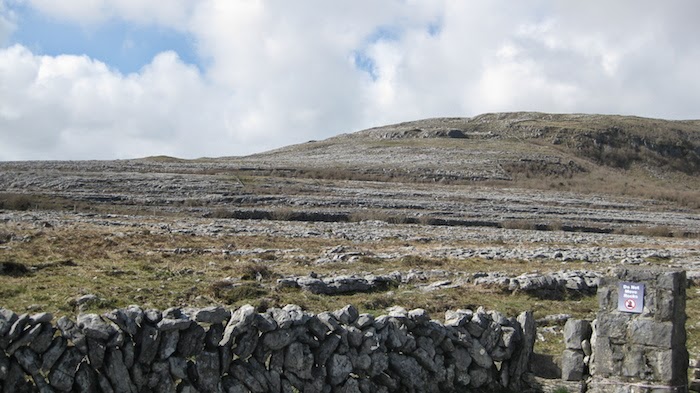This post continues our recent trip across the magnificent landscape of The Burren.
LOUGH BUNNY
Despite the name this lough has nothing to do with rabbits. The English name is loosely based upon the phonetic of the Irish name (as are all anglicised names in Ireland) Today's Irish name is Lough Buinne, 'buinne' meaning a torrent or gush of water however in 1660 the name was spelt as Loughbuna, in 1685 Loughbunagh and in 1787 Lough Buneah, all of which have a similar phonetic. There are two rough translations for these names: Lake of the flood or Lake at the foot of the mountain.
Lough Bunny is a permanent lake in a karstic limestone area of County Clare.The lough's length is 2.4 km with the greatest width at 740m, the depth ranges from 2.7M to 14m.
The fish are Perch,Rudd,Pike and the European eel.
Further information see -: http://www.burrengeopark.ie/wp-content/uploads/ArchiveFiles/BurrenGeology/A_hydrographic_study_of_Lough_Bunny.pdf
A Portal Tomb
Parknabinnia (Parc na binnia) Is a townland whose name means field of the peak. There are about six or seven similar portal tombs within a few metres of each other in this townland.
Front end of the tomb
(I do not know of a better place to be & rest my bones)
The name Burren comes from the Gaelic, meaning 'a rocky place'. Historically the name Burren referred to the Barony of Burren situated in north-west County Clare. Geographically, the name has a far wider and more complex sense and meaning. The Burren area extends some 40.2 km from east to west, and 32.2 km from north to south. It lies between Galway Bay on the north, the Atlantic coast on the west and a line drawn roughly through Doolin, Kilfenora, Gort and Kinvara. However, there is some characteristic 'Burren' outside this area to the east where one can find the same rocky features, though not as concentrated.
The rocks in the Burren region were deposited when Ireland was located ~ 10°S of the Equator, during the Carboniferous period in the Earths' history, approximately 359-299 millions of years ago. The limestones were deposited during the Viséan stage (345-326 millions of years ago) of the Carboniferous, and the sandstones, siltstones and shales, during the Namurian stage (326-315 millions of years ago).
Slieve Carron or Eagles Rock
Slieve Carron Nature Reserve (or Eagle’s Rock as it is known to locals) is state-managed land located in the heart of the north Burren, not too far from Kinvara. It has diverse habitats including grassland, limestone pavements, heathland, mature hazel woodland and grazing pastures, all of which hold a richness of species. Aside from its ecology Slieve Carron NR is also the host to a fulacht fiadh, a holy well, the site of a hermitage cave and oratory.
Not a Quarry.
Eventually, so much of the mudstone layer is washed away that
the overlying layer of limestone layer on top becomes unstable and eventually collapses under its own weight. This often leaves piles of loose blocks and boulders at the base of the terrace.
We shall return again on a future day when the mood takes us and visit other parts of this magical landscape for there is so much more to share with you.







The Burren is one of my favourite places.
ReplyDeleteI love the apparent barrenness of the landscape where in the summer months you can find hidden orchids and an abundance of wild flowers. Lovely post to bring back memories.
Thank you !
DeleteWhat I like is the way the colour of the landscape changes in certain lights.
Yes, the rock appears purple from a distance when the light is right - beautiful.
DeleteThe Burren looks a bleak yet beautiful place. It would be nice to tread the area. Thank you for sharing my good man.
ReplyDeleteThank you John. Yes am fairly sure that you would enjoy a wander over the Burren.
DeleteThe day on which we chose to go to the Burren was cold, wet and windy. Yet the magnifient landscape was really suited to such conditions - the pouring rain enhanced the place really. Now I want to see it again in the sunlight.
ReplyDeleteWeaver, you will absolutely love it for Burren vista totally glows in sunlight!
DeleteA wonderful, wild place, Mel. The photos make it look immensely appealing. I love places of ancient wilderness like this!
ReplyDeleteYes, yes Val I concur. For this wild untamed beautiful ruggedness sings deeply and raises music in our hearts.
DeleteAh I remember many trips to The Burren as a child. My lovely cousins who looked after me during all holidays would take their family, which included three children and their mom and dad (my aunt and uncle) and we would all squash into the car...really squash in....and have great trips out. This was lovely to see again Mel and bring back these memories.
ReplyDeleteAm happy to revive your childhood memories Suzie :-)
Deletepretty nice blog, following :)
ReplyDeleteThis looks like a really beautiful place, my type of place; wild, deserted and stunning scenery. I can imagine the sense of peace that one would get there. I also love the fragrance shop, would mind spending some time there. Regarding you comment, I really don't know why that is happening. As soon as I can get to a computer that allows me to look at my blog settings I will have a fiddle and see if I can change it xxx
ReplyDeleteThank you Fran. The Perfumery is great to visit if only for a cuppa and a cake plus the scenery that it is set in is stunning.
DeleteBeautiful collection of Photos Mel, just like Jane this is one of my favourite places, The myriad of wildflowers that flourish here is worth a trip any day. Wandering along the green roads connects my soul to the land in a very personal and profound way. Blessings to you. keep up the great blog.
ReplyDeleteThank you for the comment A-M sand it's great to hear from you.
Delete